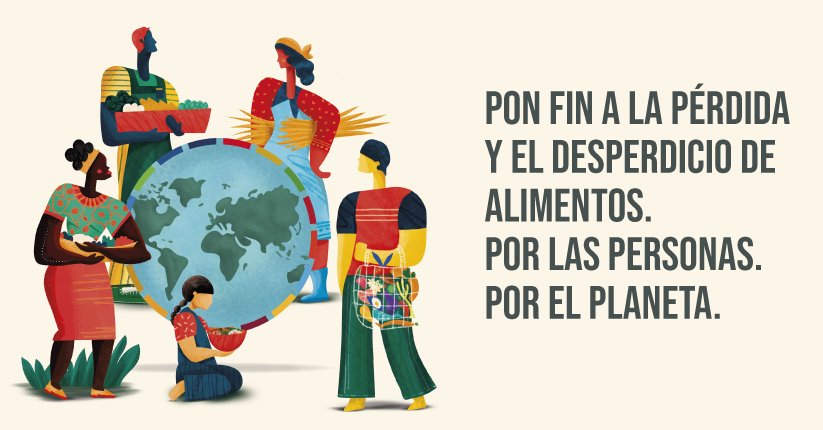
La quinta edición del Día Internacional de Concienciación sobre la Pérdida y el Desperdicio de Alimentos hará hincapié en la necesidad crítica de financiación para impulsar los esfuerzos encaminados a reducir la pérdida y el desperdicio de alimentos, contribuir al logro de los objetivos climáticos y avanzar en la Agenda 2030 para el Desarrollo Sostenible.
Enormous amounts of resources – land, water, energy, and labour – are used to produce food. When food is lost or wasted, these resources go to waste, impacting the efficiency of food production. In 2021, the percentage of food lost globally after harvest on farm, transport, storage, wholesale, and processing levels was estimated at 13.2 percent (FAO, 2023). In 2022, the food waste occurring at retail, food service and household level was estimated at 19 percent of all food available to consumers (UNEP, 2024).
The world produces enough food to feed everyone, and yet millions suffer from hunger and malnutrition. Food loss and waste exacerbate this problem by reducing the amount of food available for consumption, thus contributing to food insecurity. Many of the most highly nutritious foods, such as fresh produce, fishery, and animal products are highly perishable and sustain high levels of food loss. Food loss and waste translate into a substantial economic loss. This impacts not only producers but also consumers and nations, not to mention livelihoods and economic stability. Moreover, food waste in landfills contributes to 8 to 10 percent of total agrifood system emissions, impacting climate change and environmental sustainability. Methane gas produced by food loss and waste is at least twenty-eight times more harmful than carbon dioxide in impacting climate change (IPPC, 2021).
Food loss and waste also exacerbate inequalities. While significant amounts of food are wasted around the world, because of consumer behaviour or inefficient supply chains, in other regions people struggle with food scarcity and hunger. As the global population increases, the demand for food rises. Reducing food loss and waste can help alleviate pressure on food production systems, assuring more effective use of the available food resources.
Addressing food loss and waste throughout the supply chain, from production to consumption, would improve the overall efficiency of the food system, helping to ensure that more food reaches those in need. Target 12.3 of the United Nations Sustainable Development Goals (SDGs), aims to halve per capita global food waste at the retail and consumer levels and reduce food losses along production and supply chains by 2030, highlighting the importance of this issue in the broader context of sustainable development.
Reducing food loss and waste is crucial for improving food security and enabling healthy diets; promoting efficient resource use; mitigating hunger; protecting the environment; and fostering more equitable distribution of food resources globally. However, solutions implemented to protect and preserve foods should not lead to higher emissions through an increase in non-renewable energy, increased emissions of fluorinated gases (F-gases) or additional consumption of plastics. Instead, it is vital to control emissions to obtain sustainable limits to global warming while building resilience. Improving the circular economy to maximize the use of food through prevention, reduction, reuse, and upcycling is pivotal to diverting it away from landfills and cutting emissions.
Reducing food loss and waste is a climate solution, which countries and communities can employ to reduce greenhouse gas (GHG) emissions. Successfully doing so will require a significant increase in the quality and quantity of accessible climate finance.
IDAFLW 24 Key messages and Areas for action. Get involved!
Previous observances of the International Day of Awareness of Food Loss and Waste (IDAFLW)
International Day of Awareness of Food Loss and Waste (IDAFLW)
29 September 2020 - 1st observance
International Day of Awareness of Food Loss and Waste (IDAFLW)
29 September 2022 - 3rd observance
Link to webcasted event HERE - Photo Album HERE
FAO-UNEP Press release
Interviews
FAO technical officer
UNEP technical officer
Relevant Articles
UN Chronicle
Vatican News
El Diario
Voice of America
Videos
FAO - Reducing food loss and waste plays a key role in transforming agrifood systems
UNEP - The global food and climate crisis can be helped by reducing loss and waste
Partners' events
FEBA
Postharvest Consortium
International Day of Awareness of Food Loss and Waste (IDAFLW)
29 September 2023 - 4th observance
- Guía por cómo participar NEW!
- Global event registration link
- Asset bank (material in all languages)
- Photo album
Relevant links
En vivo
Pérdidas y desperdicio de alimentos
Take action to reduce food loss and waste towards transforming global agrifood systems
Pérdidas y desperdicio de alimentos
FAO Goodwill Ambassador Diarmuid Gavin
2022 call to action for reducing food loss and waste
E-mail contact:

